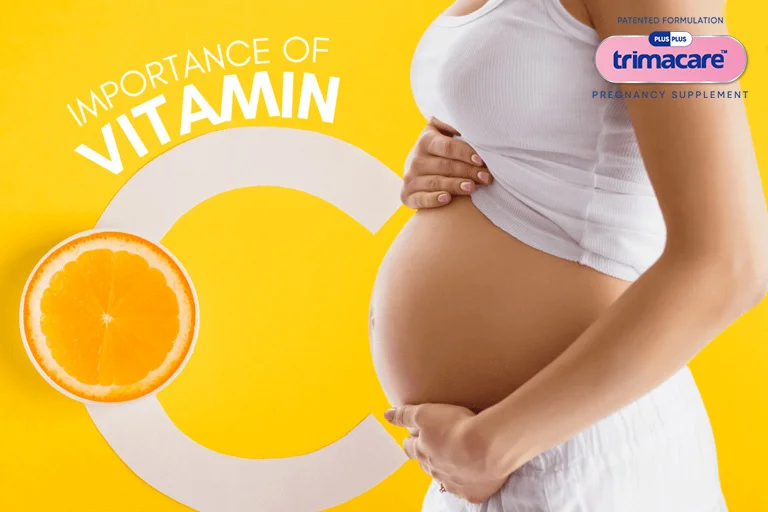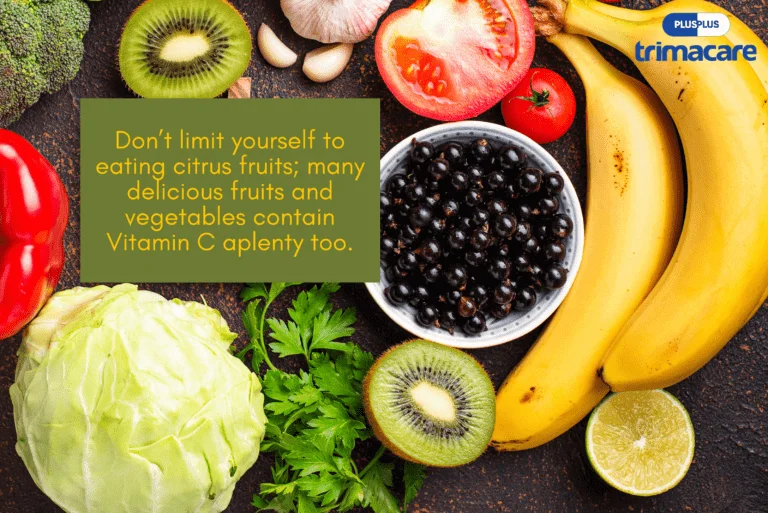Vitamin C is essential for the healthy growth and development of your baby. It is a powerful antioxidant and water-soluble vitamin that is vital whether you are pregnant. Besides being a well-known immunity booster, Vitamin C during pregnancy also plays an instrumental role in your baby’s growth and may even diminish your risk of contracting cardiovascular disease and certain cancers.
With so many benefits of Vitamin C, you may be wondering whether you should consume a Vitamin C supplement during pregnancy — especially if you’re hoping to fortify your immune system during flu season and cold.
Why is Vitamin C important during pregnancy?
Vitamin C is a water-soluble vitamin you want to include in your diet every single day; and pregnancy is no exception. Since, the human body can’t reserve Vitamin C, you’ll need a fresh supply from your diet daily.
As far as pregnancy is concerned, Vitamin C, also known as L-ascorbic acid, is vital for both mom and baby. You need it for many purposes like wound healing, tissue repair and it also helps your baby’s bones and teeth to develop, too. It also helps in boosting immunity, body’s production of collagen and, most importantly, improves your capability to absorb iron.
There are many studies that associate low blood levels of Vitamin C during pregnancy to preeclampsia. Hence, it is all the more necessary to ensure that you are consuming when you are expecting.
Best Vitamin C-rich foods for pregnant women
Lemon is the first Vitamin C source which comes to mind, doesn’t it? While that is one of the best, you have a plethora of other healthy Vitamin C sources as well. Don’t limit yourself to eating citrus fruits; many delicious fruits and vegetables contain Vitamin C aplenty too. However, Vitamin C is most effective when it is consumed uncooked and raw.
Following are a few healthy foods to get your daily dose of Vitamin C:
- Red Bell Pepper
- Grapefruit
- Strawberries
- Green Bell Pepper
- Kiwi
- Orange Juice
- Orange
- Grapefruit Juice
- Broccoli
- Brussels Sprouts
Following are the most noteworthy benefits of Vitamin C during pregnancy:
- It helps in production of collagen, which supports normal growth, healthy tissue & wound healing.
- It increases immunity.
- It helps in absorption of iron, preventing anemia.
As mentioned, Vitamin C aids the body in absorbing iron. Therefore, try to eat Vitamin C-rich foods along with those that contain iron, such as fish with Brussels sprouts or chicken with red bell peppers.
Vitamin C and iron absorption: Know its connection with pregnancy health
Vitamin C is also crucial in boosting the absorption of non-heme iron -the type of iron found in plan- based food such as legumes, leafy green vegetables and grains.
This is crucial during pregnancy, when iron needs are much higher to facilitate foetal growth and avert maternal anaemia, a condition associated with fatigue, heightened susceptibility to infections and childbirth complications.
How vitamin C increases Iron absorption?
Reduces iron to more absorbable form: Vitamin C reduces non-heme iron from its ferric form to the more soluble ferrous form, making it more easily absorbed by intestines.
Counteracts inhibitors: Substances such as phytates and polyphenols in whole grains and some vegetables can inhibit iron absorption. Vitamin C neutralizes these inhibitors, enhancing overall iron bioavailability.
Can you take Vitamin C supplements during pregnancy?
You may be wondering if you need to consume Vitamin C supplements during pregnancy, especially if you’re hoping to boost your immunity. For most pregnant women, it is fairly easy to get the recommended amounts of Vitamin C by means of a good prenatal vitamin and a healthy diet. Make sure you consult your doctor/practitioner if a Vitamin C supplement is right for you.
How much vitamin C you need during pregnancy?
The amount of vitamin C that pregnant women should consume every day is:
- 85mg per day for pregnant women over the age of 19
- 80mg per day for adolescents aged 14-18
Many individuals can achieve these requirements through a normal diet without the use of supplements. However, always ask your doctor first before adding any new supplements or vitamins during pregnancy.
Best Vitamin C Supplement for Pregnancy
Introducing Trimacare! A specially designed solution catering to the unique nutritional needs of pregnant women and their growing child, including essential nutrients like Vitamin C.
Tailored for each trimester, Trimacare understands the changing requirements throughout pregnancy and provides comprehensive and targeted nutrition to support the mother and child holistically.
Formulated using all-natural plant-based sources, Trimacare is free from chemicals and ensures high absorption. With its single-pill solution, it covers all the necessary micronutrients needed during pregnancy.
Rest assured, Trimacare is safe for consumption. It is carefully crafted with natural ingredients, devoid of any harmful chemicals or side effects. Moreover, it can help alleviate common discomforts such as morning sickness, constipation, and fatigue.
While considering Trimacare, it is important to consult your doctor before initiating any medication or special diet. Remember to prioritize activities such as reading, writing, exercise, and relaxation to promote overall well-being during this precious phase of life.
Tips to add more Vitamin C in your pregnancy diet
Having sufficient vitamin C in your pregnancy diet can give a boost to your immunity, help tissue development and it improve iron absorption to prevent anaemia. Here are simple, effective tips to increase your intake of vitamin C from your everyday foods:
- Begin your day with citrus
- Add orange or grapefruit slices to breakfast.
- Have a glass of fresh-squeezed orange juice (with no added sugar)
- Add colourful vegetables to your meals
- Add bell pepper, broccoli or brussels sprouts to stir-fries, omelettes or roasted vegetable mixture.
- Add a handful of cherry tomatoes or red cabbage into salads.
- Snack Wisely
- Have kiwi, strawberries or pineapple as snacks or blend them into a smoothie.
- Have dried mango or papaya on hand for a vitamin C packed snack (moderation due to natural sugars)
- Top it off
- Add lemon or lime juice over steamed vegetables, grains or fish to enhance both flavour and vitamin C.
- Top with salsa or fresh tomato-based sauces in wraps, pasta or tacos.
- Pair with iron-rich foods
Eat spinach with strawberries or lentils with a side of roasted red peppers to enhance iron absorption naturally with vitamin C. - Eat raw or lightly cooked vegetables
Vitamin C is also heat-sensitive, so consume some fruits and vegetables raw or lightly steamed to preserve more nutrients.
Conclusion-
Vitamin C is more than a cold-fighting vitamin- it’s a pregnancy superpower that nourishes your immune system, increases iron absorption and helps your baby develop healthily.
By eating a variety of food that are rich in vitamin C daily, you can take an effortless but effective step towards a healthier pregnancy.
Frequently Asked Questions:
- What are the benefits of Vitamin C during pregnancy?
L-ascorbic acid assumes a pivotal part during pregnancy by supporting the resistant framework, helping with the retention of iron, advancing sound tissue development, and adding to the improvement of your child’s bones and teeth.
- How much Vitamin C should a pregnant woman consume daily?
It is recommended that pregnant women consume 85 milligrams of Vitamin C per day. This amount can be easily obtained by eating a well-balanced diet rich in fruits and vegetables.
- What are some natural sources of Vitamin C for pregnant women?
Regular wellsprings of L-ascorbic acid for pregnant ladies incorporate citrus organic products like oranges, grapefruits, and lemons, as well as strawberries, kiwi, ringer peppers, broccoli, and tomatoes.
- Can excessive Vitamin C intake be harmful during pregnancy?
While L-ascorbic acid is for the most part protected, over the top admission through enhancements might prompt gastrointestinal uneasiness or the runs. Before taking supplements, it’s best to get Vitamin C from natural sources and talk to a doctor.
- How does Vitamin C contribute to the development of the baby’s immune system during pregnancy?
L-ascorbic acid backings the improvement of the child’s resistant framework by advancing the development of white platelets, which assist with fending off contaminations and sicknesses, consequently guaranteeing the general wellbeing and prosperity of both the mother and the child.
- How do I pair vitamin C and iron for improved absorption?
Combine iron-containing foods such as lentils or spinach with vitamin C-containing foods such as tomatoes, bell peppers, or citrus fruits in the same meal. For instance, squeeze lemon juice over cooked spinach or have a fruit smoothie with an iron-fortified cereal.














